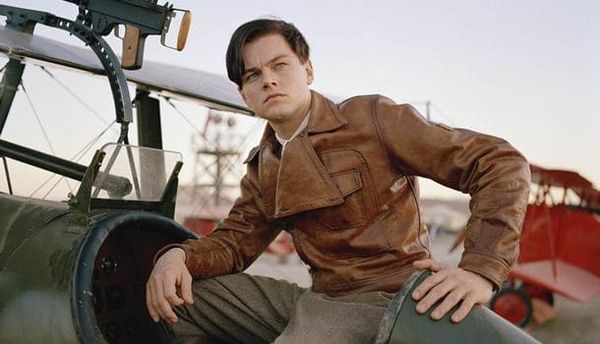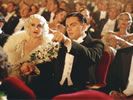Eye For Film >> Movies >> The Aviator (2004) Film Review
The Aviator
Reviewed by: Angus Wolfe Murray

Howard Hughes was larger than life, which makes it difficult for a filmmaker, even one as revered as Martin Scorsese, to do justice to him in less than three parts. What do you cut out?
In the case of The Aviator, almost three hours long, with an abrupt ending that leaves questions dangling, the answer is too much. Scorsese and scriptwriter John (Gladiator) Logan have decided to make a meal of the illness that eventually forced him in later life to become a recluse. And so the film opens with a naked boy, standing in a hip bath, being washed in soft focus close up by a beautiful woman, supposedly his mother, before an open fire in what must be a smart Houston town house, having to recite the spelling of "quarantine".

From this totally artificial and psychologically dubious scene, the audience is given a simplistic explanation for Hughes's horror of germs - he carries a bar of soap in a tin box at all times, so that he won't have to use one that has been touched by another person. His mother's glamour, not to mention the erotic manner in which she applies the soap to her son's body, suggests a correlation with his grown-up passion for movie stars.
There is nothing subtle about this film. Unlike Scorsese's early work, there is a feeling that The Aviator has been made for a Middle American farm boy, who needs to be helped through the machinations of a biopic that spans early Hollywood and the pioneering years of commercial aviation.
From the very start, Hughes was driven by a conviction that absolutes are attainable if there is enough money - he inherited a Texan fortune - and men around him who can perform miracles. He spent two years making Hell's Angels, the most expensive silent film ever, before shooting it again with sound.
He built innovative aeroplanes that tended to crash with him in them and created TWA at a time when the boss of Pan Am (Alec Baldwin) was endeavouring to tie up a monopoly deal on international air routes, with the help of a tame senator (the ever wonderful Alan Alda). Simultaneously, he was lecturing the board of film censors on the innocuous relativity of mammaries, after The Outlaw, with Jane Russell's cleavage making its controversial debut, had been banned.
When asked to marry him, Ava Gardner (Kate Beckinsale) said, "You're too mad for me, baby", and it was true, yet Hughes was so much more than his eccentricity. Brave, determined, intuitive and inventive, his energy levels blew the lid off convention. He suffered neither fools nor snobs gladly and lost millions creating prototypes of aeroplanes that other companies would benefit from afterwards.
Leonardo DiCaprio gives what can only be described as a towering performance. The only thing lacking - and this is the fault of the script - is any real understanding of Hughes's sexual appetites. Even the chemistry with Katherine Hepburn (a witty impersonation from Cate Blanchett) feels playful, rather than physical.
Scorsese makes full use of CGI in the epic flying sequences, which are only partially successful. It is DiCaprio's absorption into the character of Hughes that matters most and yet, due to the width and breadth of the man's achievements, much remains unrealised.
Reviewed on: 23 Dec 2004



















